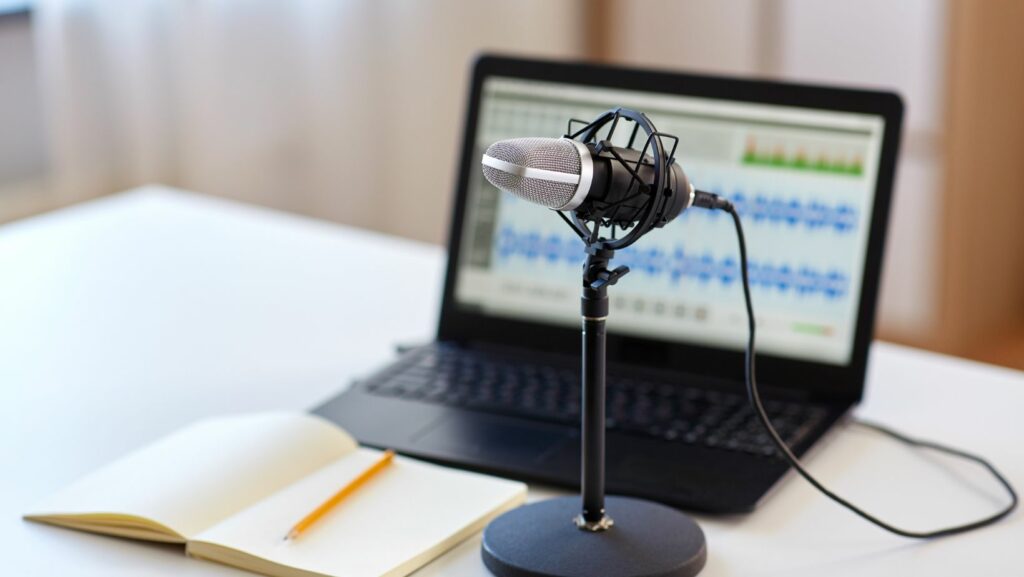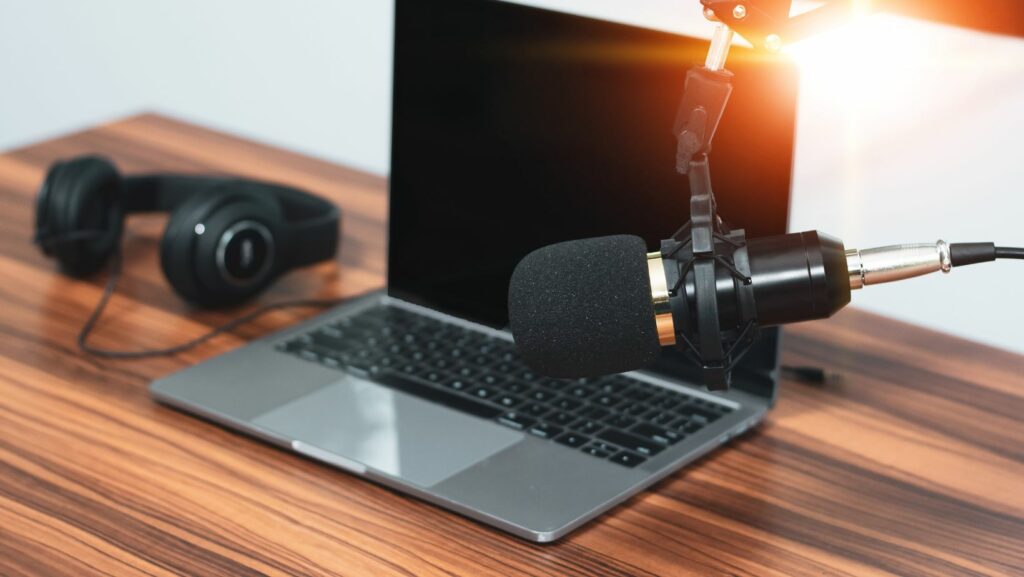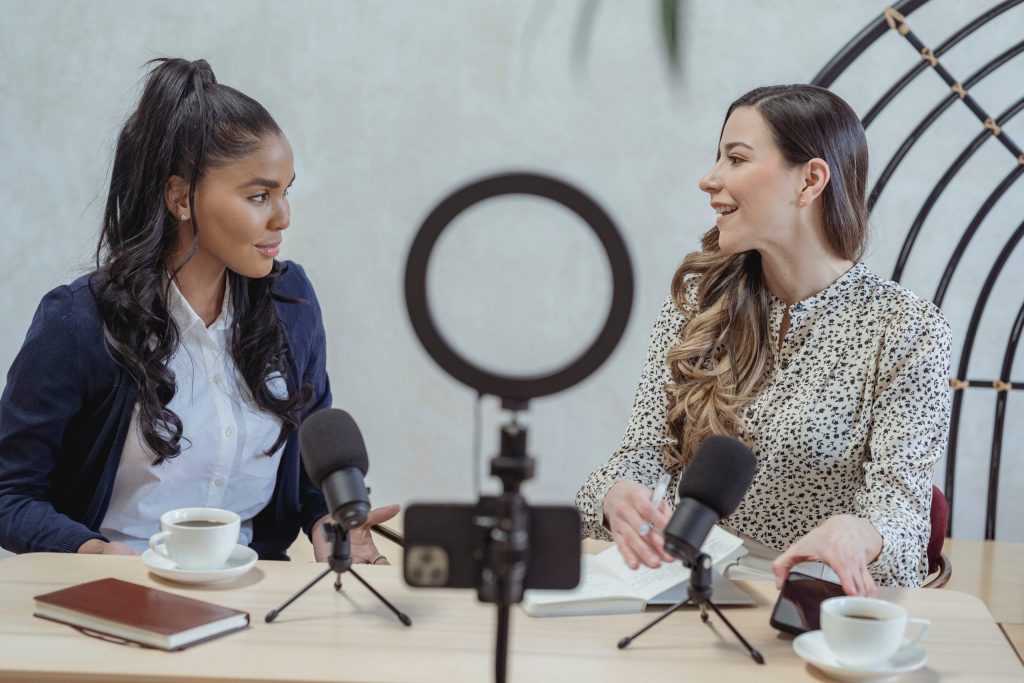Even on a budget, your experience when creating podcasts should be nothing short of magical. Digital media has taken the world on a high level of amazing content, fulfillment, and even reliable livelihood.
While a good laptop might require you to plan a big budget, usually a grand plus, there are decent laptops that require a small budget for your podcasting gig.
In this analysis, we explore the best laptops for podcasting that cost under $500. These laptops have a decent processor speed, RAM, storage capacity, and other features that podcasters who require in a laptop.
Here is a summary of our top picks:
1. ASUS VivoBook 15- most popular
2.Dell Inspiron 15.6-inch- best budget
3.2022 Newest Acer Aspire 5 – best value
Recommended Specifications For Podcasting Laptops Under $500
- 8GB RAM
- 128GB SSD
- FHD display
- HD webcam
- 2.4GHz clock speed
- Intel Core i3 processor
Best Laptop For Podcasting Under $500 Analysis: Top Picks
2022 Newest Acer Aspire 5
- 8 GB DDR4 RAM
- 256 GB SSD
- AMD Ryzen 3 3350U Quad-Core Processor
- Windows 11
The new Acer Aspire 5 features a powerful quad-core processor with a 3.5GHz, which makes it a great budget laptop for podcasting. It comes with 8GB RAM which is reliable to run all your favorite podcast apps.
This laptop’s 15.6’’ screen is FHD with LED-backlit IPS display that is amazing for videos, movies, and YouTube. If you are looking for a laptop with a fast boot experience, this laptop features a 256GB SSD that boots up the laptop within seconds of pressing the power button.
For under $500, this laptop features an HD camera to facilitate high-quality video calls when doing podcasts. The laptop allows connections through its USB ports and HDMI.
The laptop also has 8 hours long battery life to last through long hours of recording. This laptop is remarkably flexible in its upgradability. You can upgrade the RAM up to 32GB, while the SSD capacity can handle up to 2TB.
Pros
- There is room for upgrades
- It has an FHD large display
- Has an HD webcam
- High clock speed
Cons
- The first boot-up takes long
ASUS VivoBook 15
- 8GB RAM
- 128GB SSD
- Intel i3-1005G1 CPU
ASUS VivoBook 15 features the 10th generation Intel core i3 processor. The laptop has a high clock speed of up to 3.4GHz to get your podcast tasks done faster and effectively.
The laptop’s 8GB RAM is paired with a 128GB SSD, which gives you an advantage of speed in loading apps and laptop booting. One interesting feature about this laptop is its compatibility with google classroom.
This laptop has an amazing keyboard to enable you to do editing or transcription for your podcasts effectively. The keyboard is backlit, has a fingerprint sensor, and is ergonomic. This laptop also features an ergolift design to improve the typing experience.
The sleek design and high-quality feel of this laptop cannot go unnoticed. Also, the laptop battery charges quickly. It is a lightweight laptop you can carry whenever you need to travel.
Pros
- Features the latest processor
- Compatible with google classroom
- It features high-quality hardware
- Backlit keyboard with ergonomic design
Cons
- The SSD needs an upgrade

Dell Inspiron 15.6-inch
- 8GB DDR4 RAM
- 128GB SSD
- Intel Core i3-7130U
This Dell laptop is a perfect option for podcasting if you have a small budget.It comes with a powerful core i3 processor, featuring a clock speed of 2.7GHz, which is reliable for podcasting.
If you like big screens, this laptop has an amazing large display of 15.6’’ with Intel HD 620 Graphics. This laptop features an HD webcam with stereo speakers that makes it great for zoom meetings.
The laptop’s 128GB SSD storage is sufficient for files and data and delivers less booting period. This laptop has 3 USB ports and HDMI to enhance connectivity.
Pros
- It is cheap
- Large display
- Multiple USB ports and HDMI
- HD webcam with stereo speakers
Cons
- The storage space is small
- The display is not full HD
Apple MacBook Pro MF839LL/A
- 8GB RAM
- 128GB SSD
- Intel Core i5 processor with 2.7 GHz
- Intel Iris Graphics 6100 Graphics
This Apple MacBook Pro is a good refurbished option for a podcasting laptop. The laptop comes with an Intel Core i5 processor with a clock speed of 2.7GHz to deliver amazing speeds for any programs or apps.
This laptop is a good pick with an amazing display and image clarity. The laptop comes with a 3-month free return policy to affirm its great condition.
The 8GB RAM is suitable for apps, podcasting, daily laptop tasks, Premiere Pro video editing, and light gaming. The processor, RAM, and display work in harmony to ensure your laptop experience is no different from a new laptop.
Pros
- Good battery life
- Reliable processing speed
- Great price for an apple brandy
Cons
- It is not new
- SSD needs an upgrade

Buyer’s Guide: Factors To Consider When Buying a Laptop For Podcasting Under $500
Processor
A good laptop for podcasting needs a powerful processor to perform tasks reliably. A core i3 processor with a 2.4GHz clock speed can handle podcasting and medium-duty laptop tasks.
RAM
RAM is responsible for the temporary storage of data in your laptop. It needs to be enough for your podcasting needs. 8GB RAM is the minimum recommended even for budget laptops to ensure that everything runs smoothly.
Webcam
If your podcasting involves online interviews, it requires your laptop to have an HD Webcam. The webcam also comes in handy during zoom meetings or video calls with your social circle.
Budget
Since we are looking for the best laptop for podcasting under $500, budget is the first thing to check. In this case, any laptop above $500 is over budget.
FAQs
Are Laptops Under $500 Durable?
Laptops under $500 have a good life span. Most of them last even more than 5 years.
Which Is the Best RAM For Podcasting?
The best RAM for podcasting is 8GB minimum.
Conclusion
Podcasting needs a reliable laptop with good features. Even with a budget under $500, you still need to get the best deal for a podcasting laptop. The analyzed laptops feature sufficient RAM, SSD for storage, strong processor, FHD display, HD webcam, and many other amazing features to facilitate your podcast experience, on both the listener and creating end.

